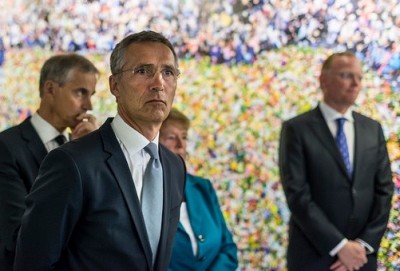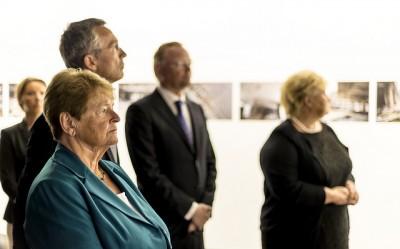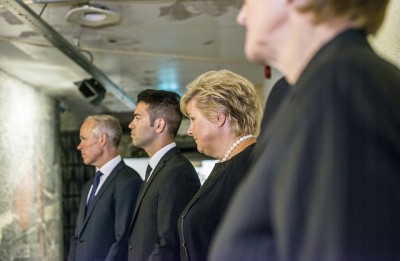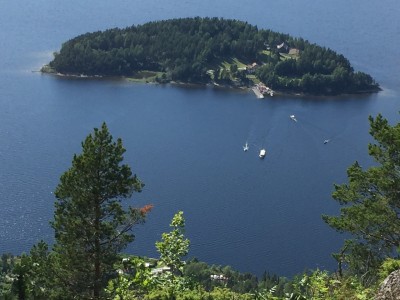UPDATED: He didn’t make any speeches this year, but Norway’s former prime minister Jens Stoltenberg was back in Oslo on Wednesday to attend memorials to the victims of the July 22 attacks on his government and Labour Party four years ago. The memorial ceremonies cut across political lines, and Stoltenberg, now secretary general of NATO, received thanks and respect from former political opponents.

Knut Arild Hareide, head of the small but powerful Christian Democrats party, was among those hailing Stoltenberg for leading Norway through one of its worst periods since World War II. At a memorial service held inside the Oslo Cathedral, which was an important gathering place in the days immediately following the attacks, Hareide gave a moving speech in which he noted how Stoltenberg had stood in the same spot four years ago and said he was proud to live in a country that stood upright and unified during the tragedy.
Hareide spoke directly to Stoltenberg, who was sitting up front in the cathedral and seemed startled by the unabashed praise of his leadership at a time of national trauma. Hareide also thanked the former leader of the Labour Party’s youth group AUF, Eskil Pedersen, for getting the organization through the tragedy after it had been targeted by a right-wing extremist gunman. “That’s worthy of our respect,” Hareide said, as the current Labour Party leader and former foreign minister, Jonas Gahr Støre, nodded in agreement.

While the victims, their families and survivors of the attacks received the most attention at memorials inside the cathedral and outside the government complex that was bombed in the attacks, Hareide and others also commended how dedicated government workers kept the country going despite the destruction of several key ministries. The main message, as Crown Princess Mette-Marit wiped away tears from her seat in the front row, was that July 22 will never be forgotten and that survivors and victims’ families are not alone in their grief, nor are those who survived the attacks but are still struggling to get over them.
“The 22nd of July will always be a dark day in Norwegian history,” Prime Minister Erna Solberg said in her remarks earlier in the day, noting how “77 lives were brutally torn away, even more were turned upside down.” Fighting back tears herself, Solberg noted how “the sorrow and longing after those lost will never go away. July 22nd created wounds that will never fully heal.”

Solberg, along with other speakers including the president of the Parliamentary Assembly of the Council of Europe Anne Brasseur, also noted this week’s attack on young people in Turkey who were gearing up to help victims of extremism in Syria. She also mentioned the recent terrorist attacks in Paris and Copenhagen, and the ongoing terror in Syria and Iraq.
“The best we can do (to fight extremism) is to show that our common values are the way to a better society, a society where there is a place for everyone,” Solberg said, urging people to think twice over what they say and do, and to challenge the hateful and extreme remarks published on social media, usually by people who won’t identify themselves.
“I can’t say that we understand (what it’s like to lose a loved one in a terrorist attack) … but we try to understand,” Solberg said. “And to show compassion, respect and sympathy. In the time after July 22, we have seen the strong ties we have as a nation … we can all make a difference.” Before opening a new information center about the July 22 attacks, she said that it can help “spread knowledge so that we can hinder hate, violence and terrorism … and the values that are important for us, the meaning of democracy and openness. We owe that to the 77 innocent youth and adults, those who so meaninglessly lost their lives that terrible day four years ago.”

The morning and mid-day memorials attracted hundreds of people including the parliamentary leadership, Members of Parliament, leaders of all of Norway’s political parties, royalty, the leaders of victims’ support groups and those who are still struggling with their grief. Brasseur, of the Council of Europe, spoke of how the attacks “shocked your country, shocked our continent, shocked the world.” The leader of the national support group, John Hestnes, ended the morning memorial with the words “Take good care of each other.”
Another memorial was held late in the afternoon, back on the Labour Party youth group’s island of Utøya, where 69 of the 77 people victims were killed. The sun shone brilliantly, Hussaini spoke again as did Støre, there was lots of hugging and long moments of silence after four wreaths were laid at the site of where the gunman’s first victims were killed. Støre, still wearing his dark suit on the otherwise informal island, applauded plans to hold the youth group’s first summer camp back on the island next month, and vowed that the young voices “from this podium, from this island, will not be stilled.” Stoltenberg was also among those laying down roses next to the wreaths.
newsinenglish.no/Nina Berglund

